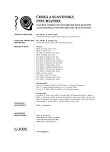-
Medical journals
- Career
Paranoid Syndrome
Authors: P. Pavlovský
Authors‘ workplace: Psychiatrická klinika 1. LF UK a VFN, Praha přednosta prof. MUDr. J. Raboch, DrSc.
Published in: Čes. a slov. Psychiat., 101, 2005, No. 6, pp. 320-322.
Category: Comprehensive Reports
Overview
The paranoid syndrome is a frequently used concept, derived from the Greek word paranoia, meaning madness (insanity). It does not only mean to be exceptionally touchy, but there are various manifestations of the patient’s nature (personality) such as hostility, inclination to aggression, venomousness, lacking sense of humor, feelings of superfluous importance of the own personality, and the inclination to accusation of others. These qualities (demerits) occur also within the framework of normal psychology and reach clinical importance only after their intensity and conspicuousness becomes escalated; exogenous effects appear to play a less significant role in the development of paranoia. The participating biological factors encompass psychiatric diseases including those caused by organic damage as well as somatic diseases. Severe hearing loss and long-term abuse of alcohol and psychostimulant drugs play important roles there. Among dynamic factors, the mechanism of projection is supposed to be most important. From the standpoint of developmental psychiatry, paranoid qualities are considered to have been important for individual’s survival. Clinically insignificant signs of being excessively touchy may occur due to an unusual situation. As soon as the paranoid reaction reaches clinical seriousness, possible development of delusion must be considered. Present terminology is listing only two diagnostic units with a paranoid denomination: schizophrenia and a specific personality disorder. The paranoid concept should only be used for denomination of a pathological condition and not for transient reactions of increased alertness and touchy reactions.
Key words:
paranoid syndrome, paranoid reaction, paranoid development, biological causes of paranoid origin, being excessively touchy, mechanism of projection, formation of delusion, paranoid disorders in ICD-10 (ICD – international classification of diseases).
Labels
Addictology Paediatric psychiatry Psychiatry
Article was published inCzech and Slovak Psychiatry

2005 Issue 6
Most read in this issue- Paranoid Syndrome
- Zen Therapy. Buddhist Psychotherapy in the Context of Western Psychotherapy
- New Trends in the Therapy of Schizophrenia
- General Practice in Using Coercive Measures – Monitoring Conditions in the Czech Republic
Login#ADS_BOTTOM_SCRIPTS#Forgotten passwordEnter the email address that you registered with. We will send you instructions on how to set a new password.
- Career

